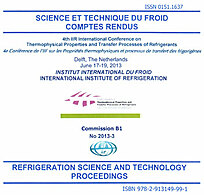
Document IIF
Analyse exergétique d'un sèche-linge à pompe à chaleur.
Exergy analysis of a heat pump tumble dryer.
Numéro : pap. n. TP-041
Auteurs : BELLOMARE F., BOBBO S., MINETTO S.
Résumé
As the market penetration of household tumble dryers increases, the legislation and the consumers are asking for higher energy efficiency and lower environmental impact. In this context, heat pump has been recognized as an attractive technology which can lead to significant energy saving compared to traditional electrically heated tumbler dryers. In this paper, exergy analysis is proposed as a tool to identify the thermodynamic losses in a heat pump tumble dryer, thus showing possibilities for performance improvements. The peculiarities of heat pump tumble dryers require an original approach to apply exergy analysis to the system. In fact, the process air flows through the drum and heat pump evaporator and condenser in a closed loop, and the air temperature lift in the condenser is particularly high with reference to other heat pump applications. The developed method was applied to a specific machine, considering also heat exchangers and compressor performances. Several refrigerants suitable for heat pump tumble dryers were analysed and compared. The main exergy losses were identified in the compressor for all the considered refrigerants, although the relative weight of each component loss was very much dependent on the specific fluid.
Documents disponibles
Format PDF
Pages : 8 p.
Disponible
Prix public
20 €
Prix membre*
Gratuit
* meilleur tarif applicable selon le type d'adhésion (voir le détail des avantages des adhésions individuelles et collectives)
Détails
- Titre original : Exergy analysis of a heat pump tumble dryer.
- Identifiant de la fiche : 30008113
- Langues : Anglais
- Source : 4th IIR Conference on Thermophysical Properties and Transfer Processes of Refrigerants
- Date d'édition : 17/06/2013
Liens
Voir d'autres communications du même compte rendu (69)
Voir le compte rendu de la conférence
Indexation
- Thèmes : Techniques des pompes à chaleur
- Mots-clés : Exergie; Séchage; Pompe à chaleur; Modèle
-
Exergetic performance assessment of gas engine ...
- Auteurs : HEPBASLI A.
- Date : 10/06/2007
- Langues : Anglais
- Source : Clima 2007. WellBeing Indoors. Proceedings of the 9th REHVA World Congress [CD-ROM + Abstract book].
Voir la fiche
-
ADVANCES IN CHEMICAL HEAT PUMPS AND HEAT TRANSF...
- Auteurs : LE GOFF P., MATSUDA H., RIVERO R.
- Date : 12/03/1990
- Langues : Anglais
Voir la fiche
-
Investigation on the performance characteristic...
- Auteurs : SUN X., ZHONG X., ZHANG M., XU J.
- Date : 31/07/2020
- Langues : Anglais
- Source : IIR Rankine Conference 2020.
- Formats : PDF
Voir la fiche
-
A field measurement of the utilizing geothermal...
- Auteurs : SAKATA T., SAITO M., KIKUTA K., et al.
- Date : 16/06/2013
- Langues : Anglais
- Source : Clima 2013. 11th REHVA World Congress and 8th International Conference on Indoor Air Quality, Ventilation and Energy Conservation in Buildings.
- Formats : PDF
Voir la fiche
-
Model-based air flow path optimization of heat ...
- Auteurs : SHEN B., GLUESENKAMP K., BOUDREAUX P., et al.
- Date : 09/07/2018
- Langues : Anglais
- Source : 2018 Purdue Conferences. 17th International Refrigeration and Air-Conditioning Conference at Purdue.
- Formats : PDF
Voir la fiche
